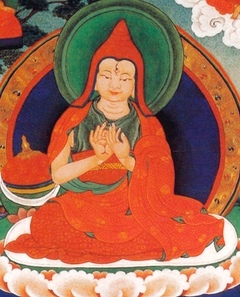A Prayer for Translators
English | Deutsch | Español | Français | Português | Italiano | Nederlands | 中文 | བོད་ཡིག
Translator's Introduction
The prayer translated below is simultaneously an invocation of the great lotsāwas of the past, such as Vairotsana, Kawa Paltsek, Rinchen Zangpo and Ngok Loden Sherab, and an aspiration to be recited by modern-day translators working with the Buddhist teachings.
Kyabjé Trulshik Rinpoche composed the text in France in 2005 in response to a request from several translators, led by Tenzin Jamchen (Sean Price) and Chökyi Nyima (Richard Barron). The text is especially significant, given that Kyabjé Rinpoche was himself regarded as an emanation of, among others, Thönmi Sambhoṭa, inventor of the Tibetan script, the peerless translator Vairotsana, and Nyak Lotsāwa Jñānakumāra.
༄༅། །ལོ་ཙཱ་བའི་གསོལ་སྨོན་བཞུགས།
Prayer for Translators
by Kyabje Trulshik Rinpoche
ཨོཾ་སྭསྟི།
om swasti
Oṃ svasti!
བསྐལ་བཟང་རྣམ་འདྲེན་སྟོན་པ་ཤཱཀྱའི་ཏོག །
kalzang nam dren tönpa shakyé tok
Guide for this fortunate age, crowning glory of the Śākya clan,
མཁན་སློབ་ཆོས་གསུམ་མེས་དབོན་རྣམ་པ་གསུམ། །
khen lop chö sum mé wön nampa sum
Khenpo Bodhisattva, Master Padmasambhava, Dharma-King Tri Songdetsen and the other two great ancestral rulers,
བསྟན་པའི་སྒྲོན་མེ་ཨ་ཏི་ཤ་ལ་སོགས། །
tenpé drönmé ati sha la sok
Beacon of the Buddhadharma, Atiśa, and the rest—
ཟླ་མེད་སྐྱེས་མཆོག་རྣམས་ལ་གསོལ་བ་འདེབས། །
da mé kyé chok nam la solwa dep
To all you peerless, most excellent of masters, we pray!
འཕགས་བོད་ཐོག་མའི་ལོ་ཙཱ་ཐུ་མི་རྗེ། །
pak bö tokmé lotsa tu mi jé
Thönmi Sambhoṭa, the first to translate from Sanskrit into Tibetan,
ལོ་ཆེན་བཻ་རོ་གཉགས་ལོ་ཡེ་ཤེས་གཞོན། །
lo chen bairo nyak lo yeshé zhön
And the great lotsāwas Vairotsana, Nyak Jñānakumāra,
ཀ་བ་དཔལ་བརྩེགས་ལྕོག་རོ་ཀླུའི་རྒྱལ་མཚན། །
kawa pal tsek chok ro lü gyaltsen
Kawa Paltsek, Chokro Lü’i Gyaltsen
ཞང་སྟོན་སྣ་ནམ་རྣམས་ལ་གསོལ་བ་འདེབས། །
zhang tön nanam nam la solwa dep
And Zhang Nanam Yeshe De, to you we pray!
རིན་ཆེན་བཟང་པོ་བློ་ལྡན་ཤེས་རབ་དང༌། །
rinchen zangpo loden sherab dang
Rinchen Zangpo, Ngok Loden Sherab,
འབྲོམ་སྟོན་ལ་སོགས་སྨྲ་བའི་དབང་ཕྱུག་སྟེ། །
drom tön la sok mawé wangchuk té
Dromtönpa Gyalwe Jungne and all the other powerful masters of speech,
ལོ་ཙཱ་སྔ་ཕྱི་བགྲང་ཡས་རྣམ་ཐར་གྱི། །
lotsa nga chi drang yé namtar gyi
Countless lotsāwas of earlier and later times,
བཀའ་དྲིན་དྲན་པས་སྙིང་ནས་གསོལ་བ་འདེབས། །
kadrin drenpé nying né solwa dep
Bringing to mind your kindness, we pray to you from the depths of our hearts!
བདག་ཅག་ལྔ་བདོའི་གང་ཟག་ལྷག་བསམ་ཁུལ། །
dak chak nga dö gang zak lhak sam kül
In this age of the five degenerations, people like us merely feign a pure motivation.
༧རྒྱལ་བའི་བཀའ་བསྟན་ཀུན་འབྱུང་འདྲེན་པ་དང༌། །
gyalwé ka ten kunjung drenpa dang
Now, as we translate into our own regional languages
དཀའ་ཐུབ་རིག་བྱེད་དབང་བསྒྱུར་ཐེག་པ་མཆོག །
katub rigché wang gyur tekpa chok
The expressing words and the meaning conveyed in the statements of the Buddha,
ཁྱད་པར་རིག་པ་འཛིན་པའི་སྡེ་སྣོད་དེ། །
khyepar rigpa dzinpé dé nö dé
The teachings of the vehicles leading from the origin, Vedic asceticism and supreme and powerful transformative methods,1
བཀའ་གཏེར་དག་སྣང་རྩ་གསུམ་ཆོས་སྐྱོང་གི །
ka ter dak nang tsa sum chökyong gi
And especially those of the piṭaka of vidyādharas,
གསུང་རབ་ཡུལ་ལུང་སོ་སོའི་སྐད་ཡིག་ཏུ། །
sungrab yul lung so sö ké yig tu
The teachings of kama, terma and pure visions,
རྗོད་བྱེད་སྒྲ་དང་བརྗོད་བྱའི་དོན་བསྒྱུར་ལ། །
jö ché dra dang jö ché dön gyur la
And those related to the Three Roots and the dharmapālas,
འགལ་རྐྱེན་བར་ཆད་མེད་ཅིང་བསམ་དགུ་འགྲུབ། །
galkyen barché mé ching sam gu drup
May we be free from adverse circumstances and hindrances, and may all our pure aspirations be accomplished!
སྔོན་བྱོན་ལོ་པཎ་རྣམས་ཀྱི་ཐུགས་བསྐྱེད་བཞིན། །
ngön chön lo pen nam kyi tuk kyé zhin
In keeping with the wishes of the great lotsāwas and paṇḍitas of the past,
བསྟན་དང་འགྲོ་བ་ཡོངས་ལ་སྨན་ནས་ནི། །
ten dang drowa yong la men né ni
May we bring benefit to the teachings of the Buddha and to all beings,
འཛམ་བུ་གླིང་དུ་༧རྒྱལ་བསྟན་རིན་པོ་ཆེ། །
dzam bu ling du gyal ten rinpo ché
And may the precious Buddhadharma spread throughout the world,
ཡར་ངོའི་ཟླ་བས་ཀུན་ཁྱབ་བཀྲ་ཤིས་ཤོག། །།
yar ngö dawé kun khyab trashi shok
Developing like the waxing moon, and bringing auspiciousness to all!
ཅེས་པའང་ཐོག་མར་ཨིང་ལཎྜའི་དགེ་སློང་བསྟན་འཛིན་བྱམས་ཆེན་དང༌། དེ་རྗེས་ལོ་ཙཱ་བ་ཆོས་ཀྱི་ཉི་མ། ལས་རབ་གླིང་གི་ལོ་ཙཱ་བ་སོགས་ནས་ལྷ་རྫས་རྟེན་བཅས་བསྐུལ་བའི་ངོར་ཤཱཀྱའི་དགེ་སྦྱོང་རྟགས་ཙམ་པ་ཀུན་རྨོངས་ངག་དབང་ཆོས་ཀྱི་བློ་གྲོས་སུ་འབོད་པས་ ༢༠༠༥ ཤིང་བྱ་ཟླ་ ༡༠ ཚེས་ ༡༦ དགེ་བར་བྲིས་ཤིང་སྨོན་པ་ཛ་ཡནྟུ།། །།
In response to the request made by the English bhikṣu Tenzin Jamchen (Sean Price) and also later on by Lotsāwa Chökyi Nyima and the lotsāwas of Lerab Ling, together with the offering of a silk scarf, I, the completely ignorant one known as Ngawang Chökyi Lodrö, who bears only the outward signs of a Buddhist monk, made this aspiration and wrote it down auspiciously on the 16th day of the 10th month of the Wood Bird year (16 December, 2005). Jayantu!
| Translated by Adam Pearcey, 2006. First published on Lotsawa School (www.lotsawaschool.org).
Version: 1.7-20241210
- ↑ On these categories see A Brief Presentation of the Nine Yanas by Alak Zenkar Rinpoche: https://www.lotsawahouse.org/tibetan-masters/alak-zenkar/nine-yanas
